|
|
|
Sort Order |
|
|
|
Items / Page
|
|
|
|
|
|
|
| Srl | Item |
| 1 |
ID:
144691
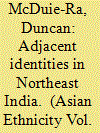

|
|
|
|
|
| Summary/Abstract |
In this article I explore the emergence, or re-emergence, of what I refer to as adjacent identities in response to changing circumstances for many Northeast communities in the last decade. In this paper I argue that it is important to consider seriously the ways in which communities in the region respond to the material and ideational changes to their lives in the present conjuncture by exploring adjacent ways of constructing identity in the face of, but not necessarily directly caused by, changing social, political, and economic circumstances. Massive investment in connectivity, which has transformed the Northeast from a frontier into a corridor, rapid urbanisation in the region, and an increase in migration out of the region have intensified the encounters between communities from the region and so-called ‘mainstream’ India and have brought different ethnic communities into closer daily proximity in the plural urban spaces of the region. The purpose of this article is to recognise adjacent ways of constructing identity in the face of, but not necessarily directly caused by, changing social, political, and economic circumstances. I provide two examples, shared Northeast identity in response to racism and broader ethnic inclusion based on shared cosmopolitanism. The former is a mass category in which virtually anyone from the Northeast can slip into, whereas the second relates specifically to speakers of a common language divided by international and internal borders.
|
|
|
|
|
|
|
|
|
|
|
|
|
|
|
|
| 2 |
ID:
178689
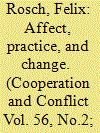

|
|
|
|
|
| Summary/Abstract |
How do practices change? To approach this in practice theory (PT) is a widely debated question. This article brings PT in conversation with the study of emotions in International Relations by considering the role of affect in practice changes. For it is affect that permeates the placiotemporal and bodily constellations during practice performances, continuously provoking changes in and through practices. In initiating this conversation, this article adds to current PT literature by arguing that world political transformations not only find their origin in external conditions, identified as such through individual reflection, but also in affective dynamics of the everyday. To elaborate this more theoretical argument, this article evolves against the empirical backdrop of dancing as an everyday international practice at the Congress of Vienna (1814–1815). Affect that permeated dances in Vienna not only substantiated changes in this practice but, with the waltz replacing the minuet as the preferred dance among international political decision-makers, also changes through it occurred. While the minuet embodied collective sentiments of a transboundary European elite, the waltz helped to further national imaginations of world politics.
|
|
|
|
|
|
|
|
|
|
|
|
|
|
|
|
| 3 |
ID:
160048
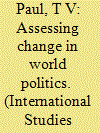

|
|
|
|
|
| Summary/Abstract |
This introductory paper of the presidential issue examines IR theory's problems and prospects in understanding when and how change happens, especially peaceful transformations in world politics. The ISA 2017 Baltimore conference was aimed at taking an assessment of our understanding of change, its different manifestations as well as implications. The papers in this special issue deal with important questions on different markers and manifestations of change in world politics. The implications might range from epochal transformations to limited changes in the international system, especially within and between regions to incremental changes in how international treaties and global governance initiatives are promulgated, which in turn produce long-term and/or short-term changes in the architecture of world politics. It also addresses the following questions: How do different IR paradigms address change? What are their strengths and weaknesses? Can we understand change sequentially or cumulatively or combining their insights? How do material and ideational factors link together in generating change?
|
|
|
|
|
|
|
|
|
|
|
|
|
|
|
|
| 4 |
ID:
160050
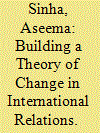

|
|
|
|
|
| Summary/Abstract |
Fundamental transformations in the distribution of power among nations have re-focused the attention of the International Relations (IR) subfield on how to understand change and power transitions. I add to this larger literature by presenting a typology of change drawn from comparative politics that incorporates attention to incremental or slow moving change, and path-dependence as a theoretical tool to explain discontinuous change such as wars, and the fall of the former Soviet Union. I offer a distinction between process of change and its outcome. Change may be incremental or disruptive and could lead to continuity with existing institutions or their transformation. This typology allows us to explore the process of change and develop theories of change in a new way. In essence, I argue for broadening our conceptions of change to account for endogenous sources of change (internal to the system), and incremental yet significant change.
|
|
|
|
|
|
|
|
|
|
|
|
|
|
|
|
| 5 |
ID:
113205
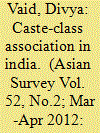

|
|
|
|
|
| Publication |
2012.
|
| Summary/Abstract |
This paper empirically analyzes the association between caste and class in India. I find a tentative congruence between castes and classes at the extremes of the caste system and a slight weakening in this association over time. Although Scheduled Castes have low upward mobility, higher castes are not entirely protected from downward mobility.
|
|
|
|
|
|
|
|
|
|
|
|
|
|
|
|
| 6 |
ID:
088123
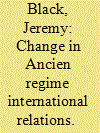

|
|
|
|
|
| Publication |
2009.
|
| Summary/Abstract |
Mapping became an important element in the mechanics of European diplomacy in the century and one-half after the Peace of Westphalia. This element was linked to what has been seen as a more defined notion of frontiers, a move away from the idea of a frontier as a zone to, instead, the idea of a distinct border that could be reproduced and charted on a map as a line. This change reflected a greater stress on undivided sovereignty, which made ambiguous relationships, such as that between France and ten Alsatian cities established by the Peace of Westphalia of 1648, unacceptable to some rulers. However, traditional ideas proved to be very persistent and mapping often served simply to clarify the existence of incompatible notions and disputed territories.
|
|
|
|
|
|
|
|
|
|
|
|
|
|
|
|
| 7 |
ID:
110194
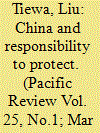

|
|
|
|
|
| Publication |
2012.
|
| Summary/Abstract |
This article tries to analyze Chinese policy stance on the Responsibility to Protect (RtoP) concept from two levels: its basic attitude towards the core principles of this concept and its specific attitudes towards the execution of this concept, that is, the international intervention actions. Starting from the clarification of the RtoP concept, the article analyzes the maintenance and change of China's stance on state sovereign and non-interference principle. In the third part, four features of Chinese specific attitudes on intervention actions are abstracted, including cautiousness, aversion of military means, emphasis of UN authority and local support. Then the article further examines China's policy during the Libyan war, and finds that it basically follows the above framework.
|
|
|
|
|
|
|
|
|
|
|
|
|
|
|
|
| 8 |
ID:
092369
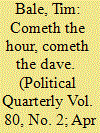

|
|
|
|
|
| Publication |
2009.
|
| Summary/Abstract |
While one can overstate the extent to which the Conservative party has changed since 2005, especially in the light of its response to the recession, the upturn in its electoral prospects is undeniable. Not surprisingly, the Conservative leader, David Cameron, is widely credited with turning around his party's fortunes. In fact, he started with several advantages over his predecessors: New Labour was well past its prime; the economy was running into trouble; and an increasingly desperate Conservative party was more willing to listen to the message that it needed to modernise and moderate. That said, Cameron has been crucial. His communication skills are unparalleled. Early success bought him time and 'permission to be heard'. Most important though, has been his determination-despite media criticism-to stick with a staged strategy focused on conveying change and a move to the centre ground while at the same time reassuring and dividing the Tory right.
|
|
|
|
|
|
|
|
|
|
|
|
|
|
|
|
| 9 |
ID:
167180
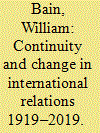

|
|
|
|
|
| Summary/Abstract |
This article reflects on themes of continuity and change over the past century of international relations. In 1919 the victors of the First World War endeavoured to remake international relations by abolishing war and erecting institutional structures that were intended to promote a more just world order. The achievements and failures of this project can be discerned in overlapping patterns of continuity and change that portray a world that is at once old and new. The discourse of change tends to dominate thinking about international relations. Technological innovation, globalisation, and human rights, among other factors, cultivate the progressive ‘one-worldism’ of an interconnected global community of nations and peoples. But, evidence of change notwithstanding, much of contemporary international relations would be intelligible to persons who lived a century ago. International relations is still fundamentally about order and security, power and restraint, and freedom and equality. These patterns provide an important reminder that progress is possible but that international relations involves an open-ended project of continuous renovation and conservation.
|
|
|
|
|
|
|
|
|
|
|
|
|
|
|
|
| 10 |
ID:
070252


|
|
|
|
|
| Publication |
Santa Monica, Rand Corporation, 1996.
|
| Description |
xix, 125p.
|
| Standard Number |
0833023748
|
|
|
|
|
|
|
|
|
|
|
|
Copies: C:1/I:0,R:0,Q:0
Circulation
| Accession# | Call# | Current Location | Status | Policy | Location |
| 038189 | 303.4827291073/GON 038189 | Main | On Shelf | General | |
|
|
|
|
| 11 |
ID:
102756
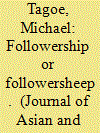

|
|
|
|
|
| Publication |
2011.
|
| Summary/Abstract |
The recent interest in transformational leaders is based on the fact that this type of leadership is change-oriented and focuses on followership development. In Ghana, a long history of failed development strategies and different political leadership styles has left the citizens disappointed in their leaders. This paper argues that Ghana needs transformational leaders who will be able to raise the quality of life of its citizens. Political leaders need to structurally transform the economic base, deal with corruption, and accelerate the pace of empowerment of ordinary Ghanaians through an effective decentralization programme.
|
|
|
|
|
|
|
|
|
|
|
|
|
|
|
|
| 12 |
ID:
171158
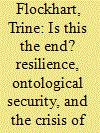

|
|
|
|
|
| Summary/Abstract |
The liberal international order is widely believed to be resilient because it has always had a remarkable ability to adapt in response to crisis and adversity. Today, the liberal order is clearly in crisis, and yet decisive action to adapt it is not taking place. Using insights from the resilience-thinking literature supplemented with insights from the literature on ontological security, the article seeks to understand why agents often fail to take decisive adaptive action, even when such action is clearly needed. The article develops a conceptual framework, including agent-level theorizing, to better understand agent motivation for undertaking adaptive action and a conception of the social site for resilience as an ideal-type social domain in which resilience is constituted and defined in the interaction between patterns of power, principles, and practice. The article contributes to resilience-thinking by demonstrating a plausible link between agents’ ability to invoke their agency and their ontological security.
|
|
|
|
|
|
|
|
|
|
|
|
|
|
|
|
| 13 |
ID:
142890
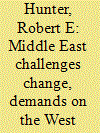

|
|
|
|
|
| Summary/Abstract |
Nearly 30 years after I wrote “US Interests and the Use of Force in the Middle East”, these aphorisms are a good starting point for assessing American interests and policies in the Middle East, including approaches to the use of force. I take some quiet pride that what I wrote back then stands up well – for that era. And in terms of analysis of American interests in the region – mutatis mutandis – it also stands up well, as do the precepts for judging policy alternatives. As of today, criteria for US use of force are close to what I perceived them to be in 1986 – though following two major detours, Afghanistan in 2001 and Iraq in 2003.
|
|
|
|
|
|
|
|
|
|
|
|
|
|
|
|
| 14 |
ID:
159535
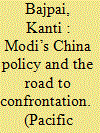

|
|
|
|
|
| Summary/Abstract |
The Doklam confrontation between India and China in the summer of 2017 was symbolic of the brewing tensions in their relationship. While the confrontation was resolved peacefully, its roots go back at least to 2007. Both the Manmohan Singh government and the Narendra Modi government pushed back against what they perceived to be a series of moves on bilateral, regional, and international issues that went against Indian interests. Modi’s responses have been more aggressive than Manmohan Singh’s in two ways. First, under Modi, India has more openly than ever before attempted to construct a coalition of militarily powerful states in the Asia-Pacific to increase Delhi’s bargaining power with Beijing. Second, India has sought to change the terms of engagement on the border conflict in three respects: a return to clarification of the Line of Actual Control (LAC) as the first step in border negotiations; linking further normalization between the two countries to progress towards a final border settlement; and seeking to inject a greater sense of urgency in the search for a settlement. This article concludes by asking why Modi responded more aggressively to China. It presents four explanations and concludes that Modi’s election in May 2014 coincided with a growing sense of strategic exasperation in India over its China policy, which questioned the value of the post-1988 commitment to normalization. The paper suggests that Modi shared that sense of exasperation, hence the rapid change in India’s stance within months of his coming to power.
|
|
|
|
|
|
|
|
|
|
|
|
|
|
|
|
| 15 |
ID:
107547
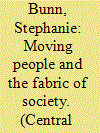

|
|
|
|
|
| Publication |
2011.
|
| Summary/Abstract |
This article explores the relationship between continuity and change in Central Asian domestic felt textile production. In order to set this in the context of a pastoralist perspective, the paper draws on regional practices such as oral poetry and movement through landscape, as well as human-environment relations in order to reveal the dynamic and creative improvisatory process through which local textile production can be understood. In so doing, it examines whether Euro-American anthropology's rejection of a 'static' notion of 'tradition' for one of hybridity (reflecting a critique of its own nostalgia), has inadvertently moved us away from a focus on the historical narratives of those we study, which is often at odds with their own concerns. The author argues that for 'moving people', it is the dynamics of orality, human-environment relations and the practice (rather than the evidence) of material culture that elucidates our understanding of the relationship between continuity and change. The power of felt is thus reflected in the apparently ephemeral, non-enduring, aspects of these practices, which are what makes them endure, continuously bringing the past into being for new cultural futures.
|
|
|
|
|
|
|
|
|
|
|
|
|
|
|
|
| 16 |
ID:
190935
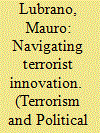

|
|
|
|
|
| Summary/Abstract |
While many scholars acknowledge terrorist innovation as a crucial issue, it still remains a rather under-researched phenomenon. This paper intends to map the field in order to propose an original conceptualization of terrorist innovation. In doing so, it draws on the Terrorism Studies, Strategic Studies, and Business Studies literatures to propose a definition of terrorist innovation, while also distinguishing between the categories of tactical, operational, and strategic innovation. Additionally, enriched with empirical observations, the paper explores potential drivers of the innovation process. Finally, it provides a set of suggestions for future research.
|
|
|
|
|
|
|
|
|
|
|
|
|
|
|
|
| 17 |
ID:
087915
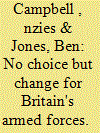

|
|
|
|
|
| Publication |
2009.
|
| Summary/Abstract |
The government is trading on the 'can do' attitude of the British armed forces in the face of inadequate equipment and service provision, and growing pressure on public expenditure. The only way forward is for the UK to take the lead in developing European defence capability.
|
|
|
|
|
|
|
|
|
|
|
|
|
|
|
|
| 18 |
ID:
171040
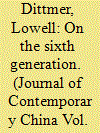

|
|
|
|
|
| Summary/Abstract |
Contrary to the current tendency to extrapolate China’s future trajectory from its current retrenchment, it is argued that China has changed substantially in the past and is likely to continue to change in the future. While change has always been strife-torn and radically contingent, it may be seen in retrospect to fit a rough pattern as occasioned by generational as well as ideological and developmental factors. Can we find clues in this pattern of change that provide some basis for speculation about China’s future? A definition of ‘generation,’ is followed by a review of the past pattern of China’s generational evolution and by a theory of generational change to account for it. The essay concludes with a discussion of China’s path-dependent cyclical future evolution.
|
|
|
|
|
|
|
|
|
|
|
|
|
|
|
|
| 19 |
ID:
092952
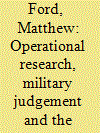

|
|
|
|
|
| Publication |
2009.
|
| Summary/Abstract |
The central claim underpinning the Revolution in Military Affairs is that battlefield imperatives drive technical and more widely social change: that technology evolves according to a logic that starts with the relationship between the offence and defence in battle. Thus the ambition of the military organisation is to develop weaponry that can beat the adversary. A failure to grasp this essential truth leads to defeat in battle. This paper demonstrates how technology change happens in practice. By looking inside the 'black box' of the military organisation, what emerges is a more complicated picture that takes into account the way arguments for technical change are constructed and deployed within the bureaucracy based on a variety of battlefield interpretations. This shows that technology development is not necessarily driven by either frontline demands or scientific understanding but in reference to who has organisational power and how they use it.
|
|
|
|
|
|
|
|
|
|
|
|
|
|
|
|
| 20 |
ID:
144063
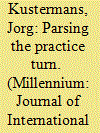

|
|
|
|
|
| Summary/Abstract |
A substantial body of literature centers on the concept of ‘practice’. This article parses the practice turn in International Relations. It suggests that the meaning of ‘practice’ is a moving target. Sometimes it means process. Sometimes it refers to a particular type of knowledge and related action. And sometimes it is used as a quasi-synonym for institution. There are actually three concepts animating the practice turn: ‘practice’, ‘practical knowledge’, and ‘practices’. These concepts hail from different intellectual pastures and lead to different ways of explaining and understanding international relations. The article introduces the three concepts, explains how each concept entails a particular interpretation of the nature and possibility of change, as well as affords a particular theory of peace(making).
|
|
|
|
|
|
|
|
|
|
|
|
|
|
|
|
|
|
|
|
|